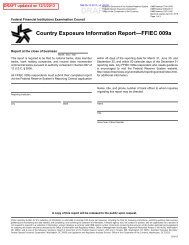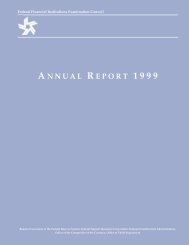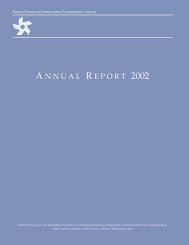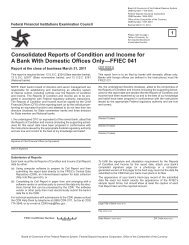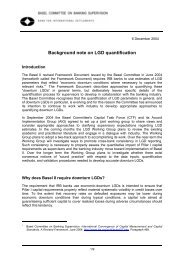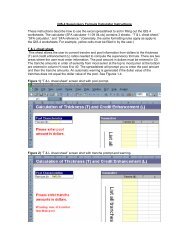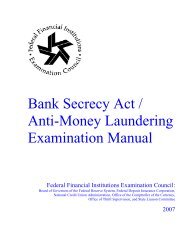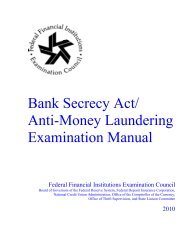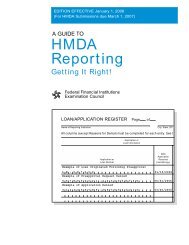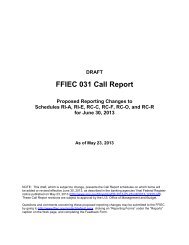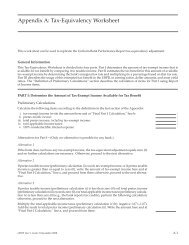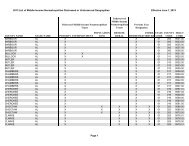Annual Report 2012 - ffiec
Annual Report 2012 - ffiec
Annual Report 2012 - ffiec
You also want an ePaper? Increase the reach of your titles
YUMPU automatically turns print PDFs into web optimized ePapers that Google loves.
24<br />
Consumer Financial<br />
Protection Bureau<br />
The Consumer Financial Protection<br />
Bureau (CFPB) was created in<br />
2010 by the Dodd-Frank Act and<br />
assumed transferred authorities<br />
from other federal agencies, and<br />
other new authorities, on July 21,<br />
2011. The CFPB is an independent<br />
agency and is funded principally<br />
by transfers from the FRB up to a<br />
limit set forth in the statute. The<br />
CFPB requests transfers from the<br />
Board in amounts that are reasonably<br />
necessary to carry out its mission.<br />
Funding is capped at a preset<br />
percentage of the total 2009<br />
operating expenses of the Federal<br />
Reserve System, subject to an<br />
annual adjustment. The Director<br />
of the CFPB serves on the FDIC<br />
Board of Directors and the Financial<br />
Stability Oversight Council.<br />
The CFPB seeks to foster a consumer<br />
financial marketplace<br />
where customers can clearly see<br />
prices and risks up front and can<br />
easily make product comparisons;<br />
in which no one can build a business<br />
model around unfair, deceptive,<br />
or abusive practices; and that<br />
works for American consumers,<br />
responsible providers, and the<br />
economy as a whole. To accomplish<br />
this, the CFPB works to help<br />
consumer financial markets operate<br />
by making rules more effective,<br />
by consistently and fairly<br />
enforcing those rules, and by<br />
empowering consumers to take<br />
more control over their economic<br />
lives.<br />
The Dodd-Frank Act sets forth the<br />
following functions for the CFPB:<br />
• conducting financial education<br />
programs;<br />
• collecting, investigating, and<br />
responding to consumer<br />
complaints;<br />
• collecting, researching, monitoring,<br />
and publishing informa-<br />
tion relevant to the identification<br />
of risks to consumers and<br />
the proper functioning of financial<br />
markets;<br />
• issuing rules, orders, and guidance<br />
implementing federal consumer<br />
financial laws;<br />
• taking appropriate enforcement<br />
action to address violations<br />
of federal consumer financial<br />
laws; and<br />
• supervising covered entities<br />
to assess compliance with federal<br />
consumer financial laws<br />
and detect financial risks to<br />
consumers.<br />
The CFPB has statutory authority<br />
to conduct examinations to<br />
ensure that consumer financial<br />
products and services conform to<br />
certain federal consumer financial<br />
laws, and for related purposes.<br />
The CFPB’s supervision program<br />
oversees:<br />
• Insured depository entities with<br />
total assets over $10 billion and<br />
their affiliates. These institutions<br />
collectively hold more<br />
than 80 percent of the banking<br />
industry’s assets.<br />
• Certain nondepository entities<br />
regardless of size—mortgage<br />
companies (originators,<br />
brokers, and servicers, as well<br />
as related loan modification<br />
or foreclosure relief services<br />
firms), payday lenders, and<br />
private education lenders. The<br />
CFPB can also supervise the<br />
larger players, or “larger participants,”<br />
as defined by rule,<br />
in consumer financial markets,<br />
and certain nondepository entities<br />
that it determines are posing<br />
a risk to consumers in connection<br />
with the offering or<br />
provision of consumer financial<br />
products or services. In <strong>2012</strong>,<br />
the CFPB began identifying<br />
other markets in which it will<br />
supervise the larger partici-



